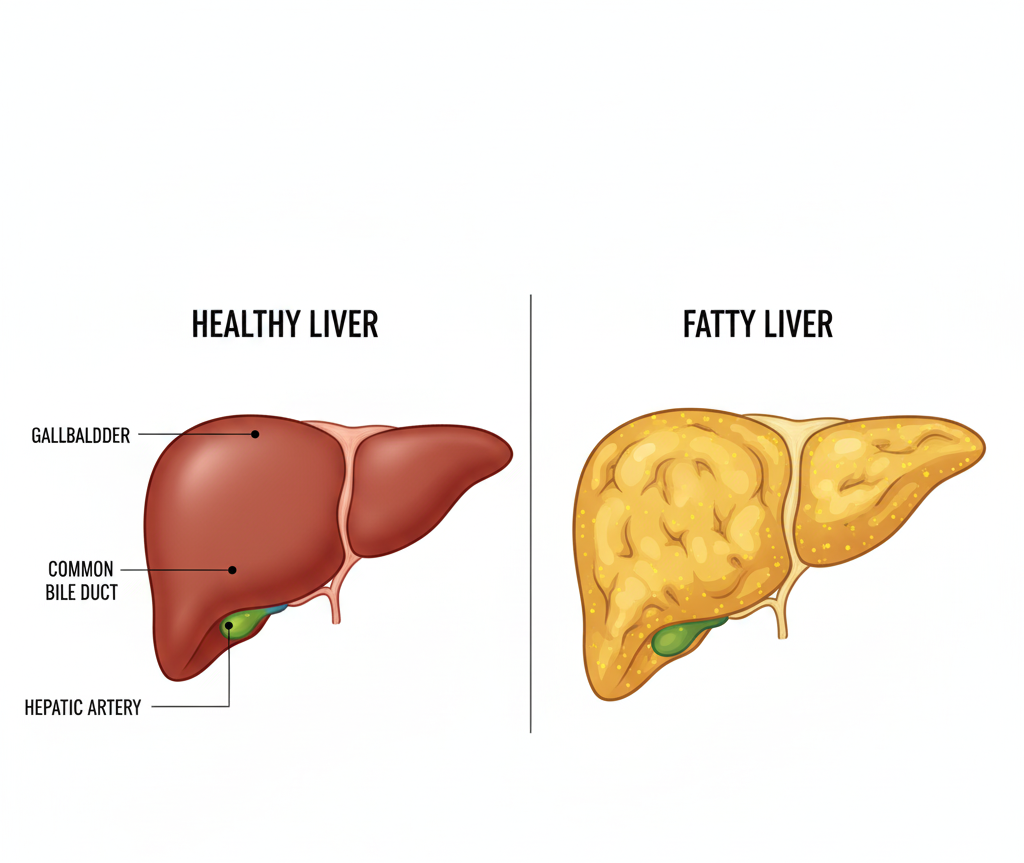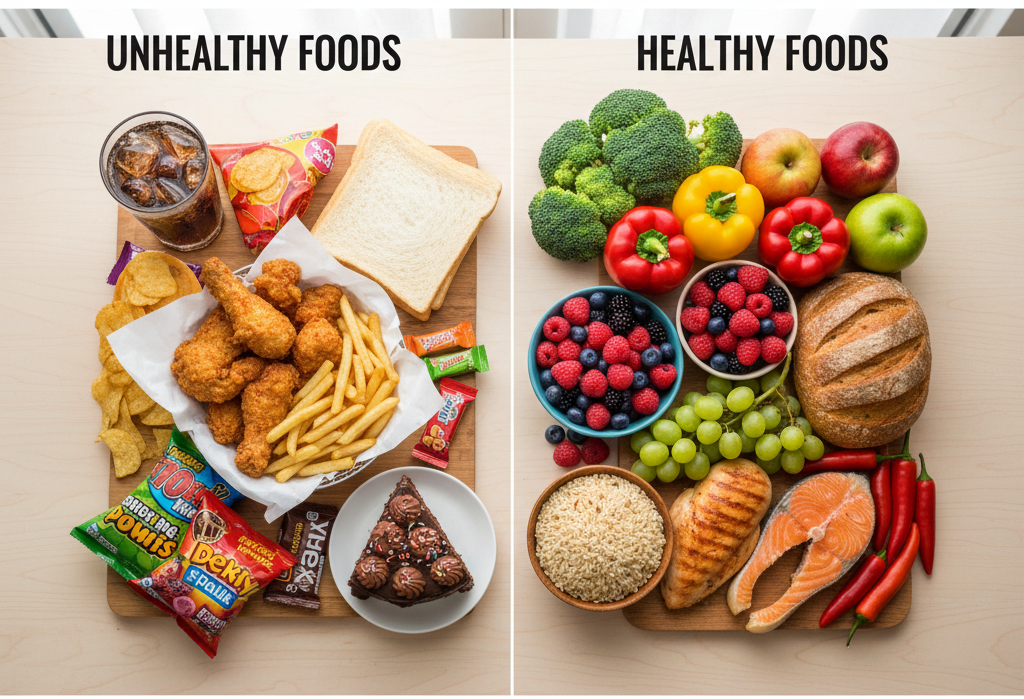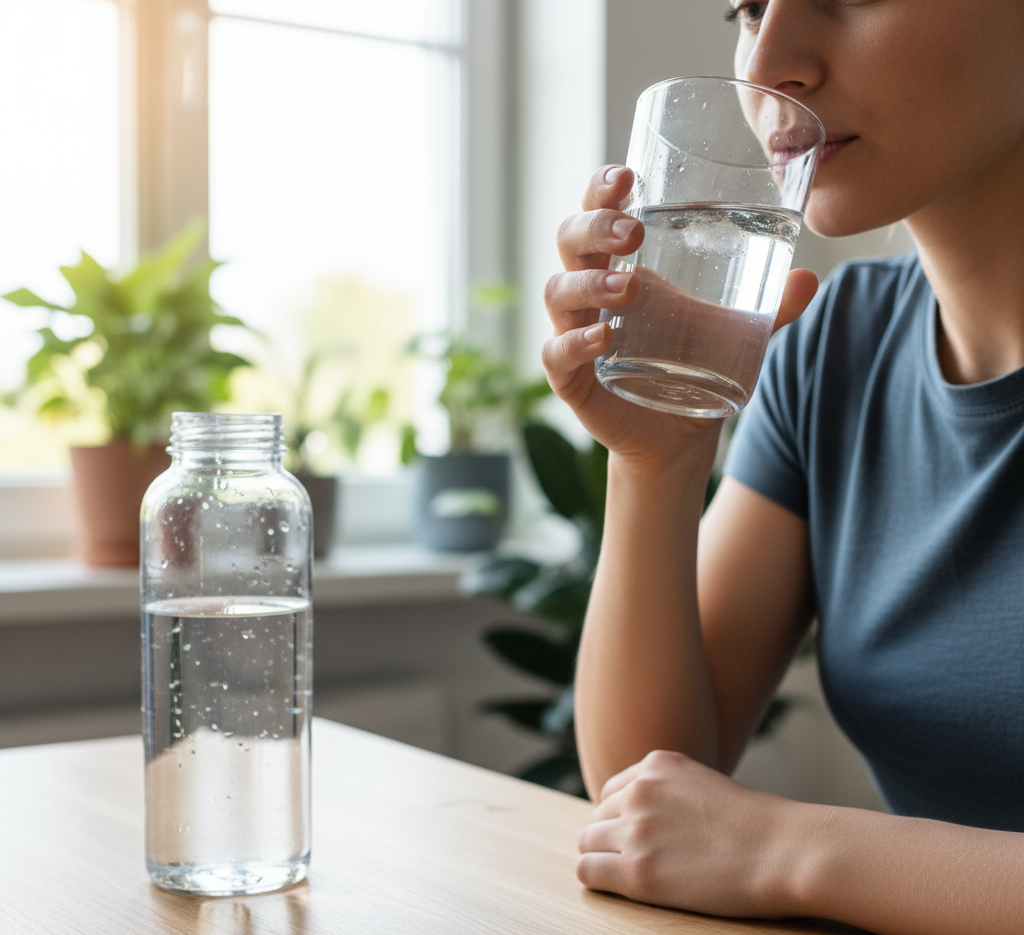You just left your doctor’s office, scan results in hand, and heard three words that made you pause: “fatty liver disease.” Or your blood work came back showing elevated liver enzymes or high cholesterol levels. Either way, you’re probably wondering what this means for your health and what you should do next.

If you’re feeling confused or worried, you’re not alone. Fatty liver disease is becoming increasingly common in America, affecting millions of people who’ve never had more than a casual drink. The good news? Understanding this condition is the first step toward protecting one of your body’s most essential organs. Let’s break down what fatty liver really means and, more importantly, how you can take control of your liver health starting today.
What Exactly Is Fatty Liver Disease?

Think of your liver as your body’s processing plant, working 24/7 to filter toxins, produce essential proteins, and help digest your food. It’s one hardworking organ that deserves some respect. Fatty liver disease happens when fat cells start accumulating in your liver beyond normal levels.
Here’s the thing: a healthy liver naturally contains a small amount of fat, and that’s completely normal. But when fat makes up more than 5% to 10% of your liver’s total weight, you’ve crossed into fatty liver territory. This excess fat makes it harder for your liver to perform its job efficiently, much like trying to run a marathon while carrying a heavy backpack.
There are two main types of fatty liver disease that you should be aware of. Non-alcoholic fatty liver disease (NAFLD) affects people who drink little to no alcohol, while alcoholic fatty liver disease (AFLD) is directly caused by excessive alcohol consumption. Regardless of which type you might have, the bottom line is the same: excess fat in your liver isn’t something to ignore.
Why Does Fat Build Up in the Liver?

You’re probably wondering, “How did this happen to me?” The truth is, fatty liver disease doesn’t develop overnight, and several factors usually work together to create the problem. Let’s look at the most common causes:
Excess body weight is the number one risk factor. When you’re carrying extra pounds, especially around your midsection, your liver is more likely to store excess fat too. It’s not about blame—it’s just how our bodies respond to weight gain.
Your diet plays a huge role. If your meals regularly include sugary sodas, energy drinks, white bread, pasta, rice, cookies, cakes, and fried foods, you’re giving your liver a lot of extra work to do. Those refined carbohydrates and added sugars get converted to fat, and where does some of that fat end up? Yep, your liver.
Type 2 diabetes and insulin resistance create a perfect storm for fatty liver disease. When your body can’t properly process insulin, it affects how fats are metabolized, leading to accumulation in the liver. If you have diabetes, you’re at significantly higher risk.
High cholesterol and triglyceride levels in your blood don’t just affect your heart—they impact your liver too. These blood fats can contribute to the fatty deposits building up in your liver cells.
Excessive alcohol consumption is obviously a direct cause of AFLD. Alcohol is essentially toxic to your liver, and over time, even moderate drinking can take its toll.
A sedentary lifestyle doesn’t help matters either. When you’re not moving your body regularly, fat tends to accumulate in various areas, including the liver.
Certain medications, particularly some steroids used long-term, can contribute to the problem. Always discuss potential side effects with your doctor.
Other health conditions like PCOS (polycystic ovary syndrome) in women, hypothyroidism (underactive thyroid), and even rapid weight loss can trigger fatty liver disease. Sometimes genetics plays a role too—if fatty liver disease runs in your family, you might be more susceptible.
How to Protect Your Liver?
Here’s where we get to the empowering part. Whether you’re trying to prevent fatty liver disease or you’ve already been diagnosed and want to reverse the damage, the same strategies apply. And the best part? They’re all within your control.
Overhaul your diet—but make it sustainable. You don’t need to eat like a rabbit or follow some extreme diet plan. Just focus on these principles: dramatically reduce added sugars and unhealthy oils. Reduce your intake of refined carbohydrates, such as white bread, white rice, and regular pasta. Instead, fill your plate with colorful vegetables, fresh fruits, legumes (beans and lentils are fiber powerhouses), whole grains like brown rice, quinoa, and oats, and lean proteins such as fish, skinless chicken breast, egg whites, and nuts.
Home-cooked meals are your secret weapon. When you prepare food at home, you have complete control over what goes into your body. Restaurant and processed foods are loaded with hidden sugars, unhealthy fats, and excessive sodium that your liver doesn’t need to deal with.

Get moving—and keep moving. You don’t need a fancy gym membership or a personal trainer to protect your liver. What you do need is consistent physical activity. Aim for at least 30 minutes of moderate exercise most days of the week. This could be brisk walking around your neighborhood, cycling, swimming, dancing in your living room, or any activity that gets your heart pumping and your body moving. The goal is to be active at least five days a week. Your liver will thank you.
Achieve and maintain a healthy weight. Since obesity is the leading cause of fatty liver disease, reaching a healthy weight for your height is crucial. But here’s the critical part: lose weight gradually and healthily. Crash diets and rapid weight loss can actually harm your liver. Aim for steady, sustainable weight loss through a balanced diet and regular exercise. Even losing just 7-10% of your body weight can make a significant difference in reducing liver fat.
Seriously reconsider your relationship with alcohol. If you have fatty liver disease, alcohol should be off the table completely. Even if you don’t have a diagnosis yet, but you’re at risk, cutting back significantly or quitting entirely is one of the best gifts you can give your liver. Alcohol is essentially poison to this vital organ, and there’s no safe amount once your liver is already struggling.
Eliminate sugary drinks and processed foods. Sodas, sweetened coffee drinks, energy drinks, fruit juices with added sugar, packaged snacks, fast food, and processed meats like hot dogs and deli meats should become rare treats at best. These foods are packed with harmful sugars, excessive sodium, and chemicals that burden your liver unnecessarily.
Stay hydrated. Drinking plenty of water throughout the day supports all your body’s functions, including helping your liver do its job more efficiently. Aim for at least eight glasses a day, more if you’re active or it’s hot outside.

Fatty liver disease might sound scary, but it’s largely preventable and, in many cases, reversible. Your liver has a remarkable ability to heal itself when provided with the proper support. By adopting these healthy lifestyle habits—eating whole foods, exercising regularly, maintaining a healthy weight, limiting alcohol, and staying hydrated—you’re giving your liver the fighting chance it needs.
Remember, you don’t have to make all these changes overnight. Start with one or two modifications, get comfortable with them, and gradually add more healthy habits. Small, consistent steps lead to significant results over time.
A healthy liver is essential for a healthy life, and now you know how to protect yours. Share this information with friends and family who might benefit from it—because when it comes to health, we’re all in this together.

